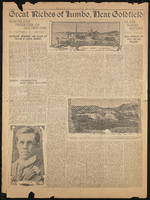Search the Special Collections and Archives Portal
Search Results
Hal Rothman Faculty Papers
Identifier
Abstract
The Hal Rothman Faculty Papers (approximately 1930-2006) are comprised primarily of research, teaching, and professional papers of Hal Rothman, professor of history at the University of Nevada, Las Vegas (UNLV). The papers include Rothman's research notes, manuscript drafts, conference articles, lecture notes, audiovisual material for his book
Archival Collection
Phillip L. Cook oral history interview
Identifier
Abstract
Oral history interview with Phillip L. Cook conducted by Richard Strahan on March 3, 1977 for the Ralph Roske Oral History Project on Early Las Vegas. Cook first talks about his parents' move to Nevada and discusses how the school system has changed over time. He then describes the first businesses that opened up in the Downtown and Strip areas of Las Vegas, Nevada before discussing prostitution, Block 16, and recreational activities available to youth. Cook also talks about the first television sets and telephone systems made available, and he moves on to talk about the prices of things such as movies and haircuts when he was younger. The interview then moves to discussions on the Old Ranch, racial discrimination, school integration, the crime rate, and the school system in Las Vegas.
Archival Collection

Arturo Ochoa interview, April 9, 2019: transcript
Date
Archival Collection
Description
On the corner of Eastern and Stewart, inside the East Las Vegas Community Center, lies an oasis of creativity and art. The halls ring with the sound of harmonious music coming from the meeting rooms, where children move violin bows up and down in a synchronized motion. They stare with concentration at the music sheets in front of them. They gracefully play together and fill the empty halls with classical music. For most of them, they are the first in their family to learn how to play an instrument. Like many in their neighborhood, they are also first-generation Americans. The students are rehearsing for their recital with the Las Vegas Philharmonic at the Smith Center in a few weeks. In the back of the room there is a man gleaming with pride and joy. The Foundation to Assist Young Musicians (FAYM) provides the rehearsal space, violins, and music lessons at the community center and allows these children to flourish despite their economic, social, or racial background through, “Building
Text
Southern Nevada Daughters of the American Revolution Records
Identifier
Abstract
The Southern Nevada Daughters of the American Revolution Records primarily document the activities of three Southern Nevada chapters of the National Society Daughters of the American Revolution from 1950 to 2024. The materials center around the records of three chapters from Southern Nevada: Old Spanish Trail, Francisco Garces, and Valley of Fire. Materials include administrative records, scrapbooks, photographs, news clippings, and correspondence about the activities of the Daughters of the American Revolution chapters. Mateirals also include some records and scrapbooks from the Nevada State Society of DAR.
Archival Collection

Pom Fritz oral history interview: transcript
Date
Archival Collection
Description
Oral history interview with Pom Fritz conducted by Kristel Peralta and Stefani Evans on June 8, 2021 for Reflections: The Las Vegas Asian American and Pacific Islander Oral History Project. Pom talks about her family and upbringing in Udon Thani, Thailand and her immigration to the United States with her second husband, an American citizen, in 1972. She discusses living on Air Force bases in North Carolina and California before moving to Las Vegas and finding work at different hotels. Pom shares her experiences as a member, steward, and executive board representative of the Culinary Workers Union and what she recalls from the Frontier Strike. She also talks about her children and grandchildren, some of whom still live in Thailand.
Text

Interview with Lafayette "Lafe" H. Dana, June 20, 2005
Date
Archival Collection
Description
Text
Wolff, Walter P., 1928-2016
http://www.ladailypost.com/content/obituary-walter-p-wolff-dec-29-2016
copied from resouce above
Person
UNLV Libraries Collection of Boyd Gaming Promotional Materials and Reports
Identifier
Abstract
The UNLV Libraries Collection of Boyd Gaming Promotional Materials and Reports includes annual reports, clippings, financial reports, a press kit, press releases, and promotional materials for Boyd Gaming Corporation in Las Vegas, Nevada, dating from 1986-2009.
Archival Collection
Baneberry Nuclear Test Trial Records
Identifier
Abstract
The Baneberry Nuclear Test Trial Records (1969-1989) contain documents of a federal court case regarding a 1970 Nevada Test Site nuclear test and the resultant radioactive cloud which may have exposed and subsequently injured the test site workers. The consolidated suits, William Nunamaker vs. the United States and Harley Roberts vs. the United States, came to trial January 1979, in Federal District Court, Las Vegas, U.S. District Judge Roger Foley presiding. The materials in the collection consist of court documents, such as transcripts of the trial, briefs, findings and statements, an appeal, orders, defense and plaintiff exhibits, and indices to the exhibits and witnesses as well as a glossary of terms.
Archival Collection

